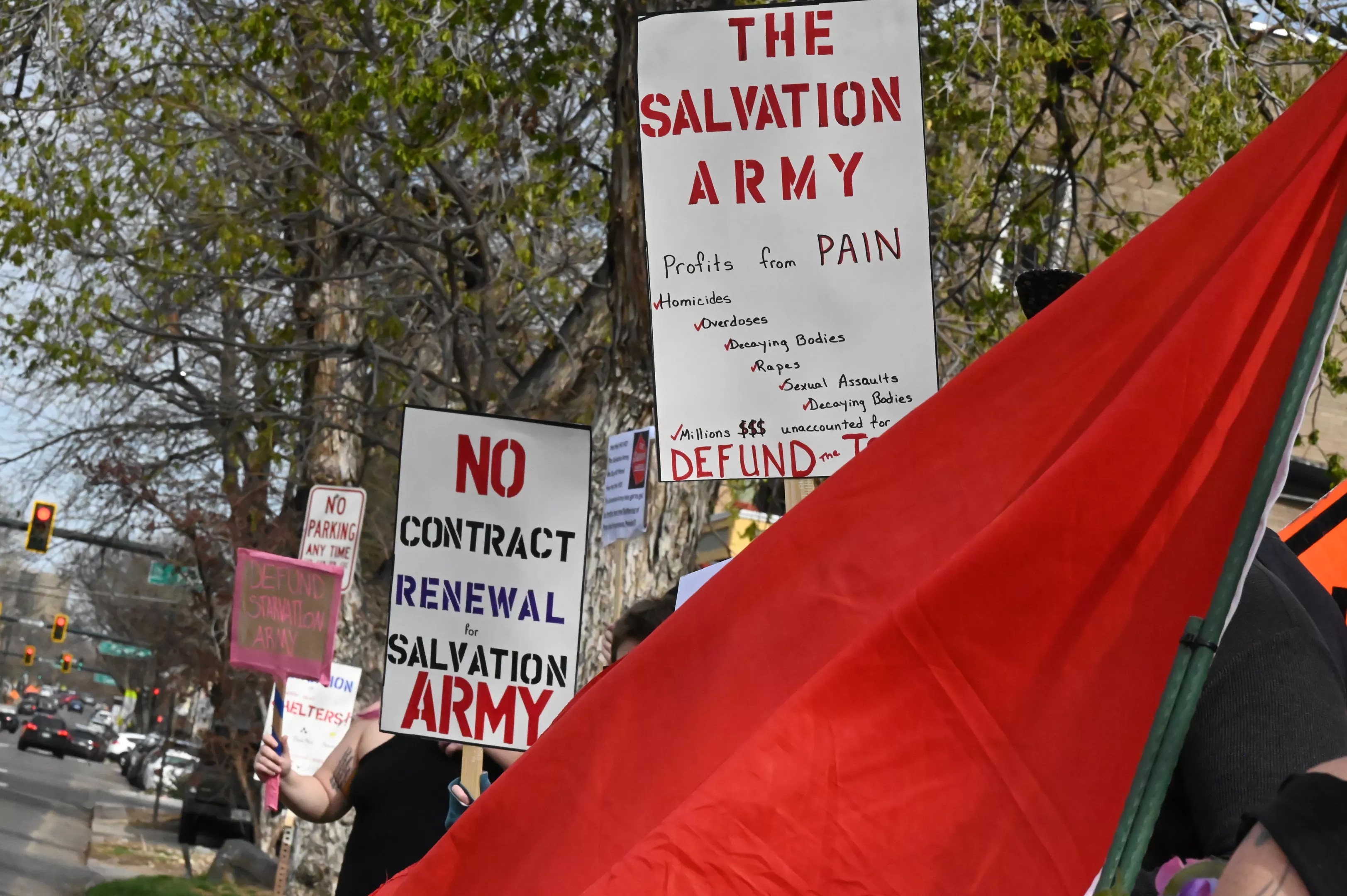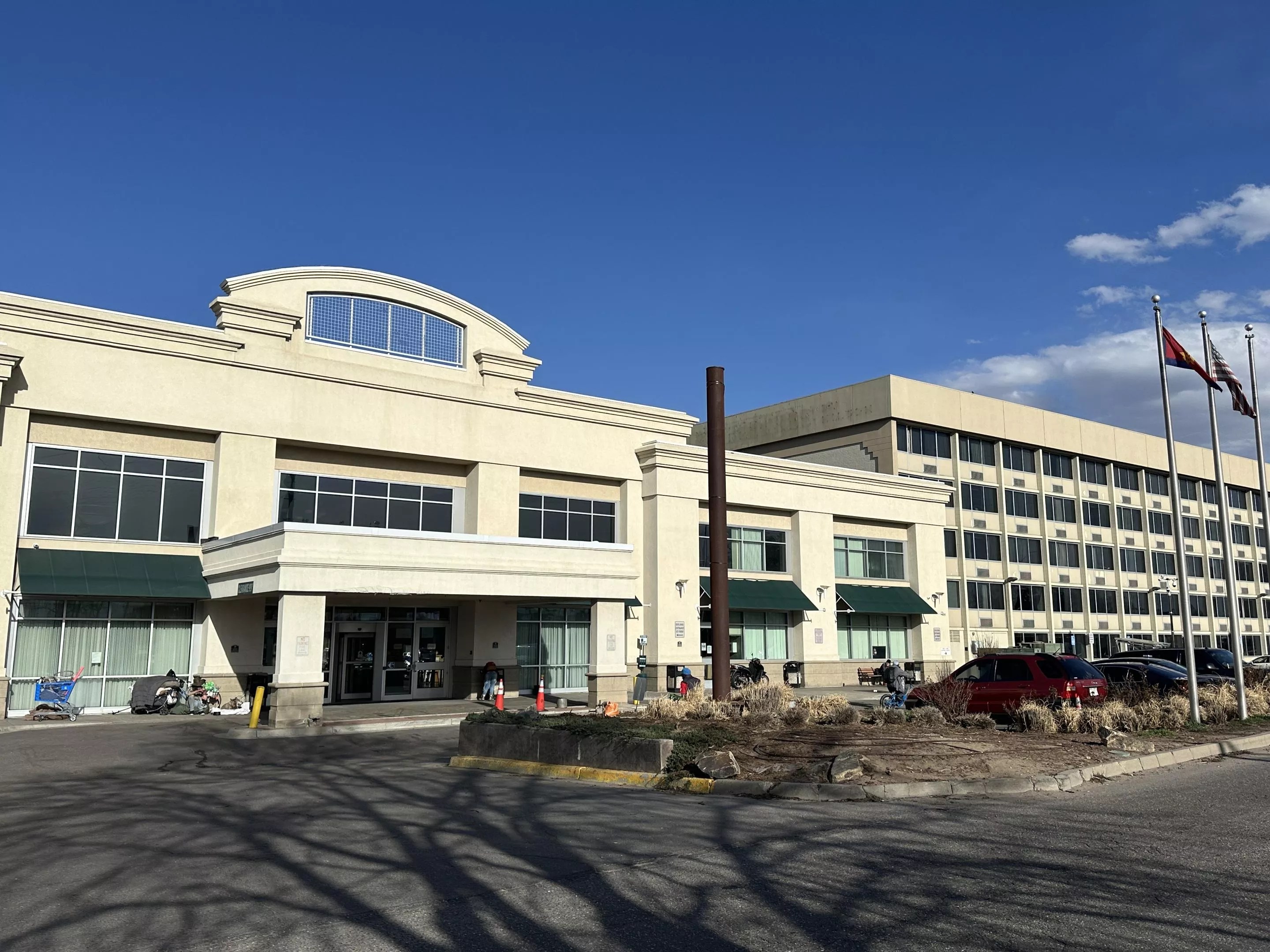
Bennito L. Kelty

Audio By Carbonatix
Worried about violence and poor service at Denver’s largest homeless shelters, local activists are questioning whether the city should keep signing million-dollar contracts with the Salvation Army.
“They’ve been poor performers for many years,” says Amy Beck, an activist with Together Denver, a group supporting homeless residents. “And now that they’ve taken on these larger contracts, they’re performing horribly.”
A global, 160-year-old Christian charity, the Salvation Army has contracts with the City of Denver to run five shelters, including three hotels purchased by the city and converted into shelters for All In Mile High, Mayor Mike Johnston’s initiative to solve Denver homelessness.
An employee at the Salvation Army-operated shelter at the DoubleTree hotel, 4040 Quebec Street, was arrested on March 21 for sexually assaulting a resident. The incident happened a year after a double homicide at the DoubleTree, which was later called “MurderTree” or the “TroubleTree” by both housed and unhoused Denver residents. No one has been arrested for the double homicide, according to the Denver Police Department; it was followed by a non-deadly shooting a week later, which led to two arrests.
The sexual assault involved a former convict who served prison sentences for kidnapping and bank robbery charges from 2010 to 2015. He was hired for night watch patrols by the Salvation Army, which did a background check but wasn’t able to see his prior charges because Colorado law prohibits pulling records from before seven years ago, according to Jennifer Forker, a spokesperson for the Salvation Army.
During a March 24 meeting, the Denver City Council blamed the sexual assault as their reason for rejecting a $3 million, three-year contract with the Salvation Army that would have moved fifty families into housing. The contract would have paid for “rapid rehousing services” like mental and physical health care, rental assistance to cover deposits, application fees and utilities and helping families buy furniture.
The contract was relatively small, and city council rarely turns down homeless service provider contracts. Activists are seizing the moment to stop all contracts with the Salvation Army, pile on more complaints and demand more public input on contracts with homeless service providers.
“There’s murders, there’s rapes, there’s overall mistreatment by staff, there’s overall bad training by staff, there’s the conditions of their shelters in terms of cleanliness,” says Terese Howard, the lead organizer for Housekeys Action Network Denver (HAND), an activist group for homeless residents. “We don’t want anymore contracts with the Salvation Army, and the city needs to change the way it does contracts with other providers.”
HAND organized a protest on Tuesday, April 8, outside of the Salvation Army Intermountain Divisional Headquarters at 1370 Pennsylvania Street, where other activists at the protest also supported increased scrutiny.
“It’s been a long time coming. The Salvation Army has a long history of not running their shelters well, so it’s good that people are questioning the city’s contracts with them,” Ian Stitt, the executive director of homeless service provider Network Coffee House, told Westword at the protest. “The city has to make a call on whether these contracts are a smart decision and safe for the community. And if they’re not safe for the community, then the city shouldn’t continue working with them.”
Mayor Mike Johnston’s office and the Salvation Army put out a joint statement on Tuesday, April 8, in response to HAND’s press conference.
“We are a better city today for the efforts of the Salvation Army,” Johnston’s statement reads. “The Salvation Army performs a difficult job at an extremely high level, and I know they are as committed to accountability and improvement as they are to our shared mission of ending unsheltered homelessness in Denver.”
The Salvation Army plans to continue working with the city, according to Nesan Kistan, the commander of the Salvation Army Intermountain Division, which covers Utah, Wyoming, Colorado and parts of Montana.
“The Salvation Army has served Denver for more than 150 years, and we look forward to serving for 150 more,” Kistan said in the joint statement. “The safety and wellbeing of those in our care will always be our top priority as we continue to work with the City and County of Denver to better lives, protect families, and ensure no one has to sleep on the street.”
Million-Dollar Contracts at Stake
Since Johnston announced an effort to house 1,000 people in six months in late 2023, the Salvation Army has since been in charge of three city-owned homeless shelters: the DoubleTree, the Best Western at 4595 Quebec Street and the Tamarac Family Shelter at 7525 East Hampden Avenue.
The city paid $10 million in 2024 and will pay $9.2 million in 2025 for the Salvation Army to manage and oversee the largest city-owned shelter: the 300-room DoubleTree, which has been renamed as the Aspen Shelter. The Salvation Army is near the end of a $2.6 million contract extension from September to run the Tamarac shelter until June 15, and the city will soon have to decide whether to renew a contract for staffing at the Best Western, now the Stone Creek Shelter, which received a $1.2 million, three-month extension that ended in March, but was extended indefinitely.
If city council doesn’t negotiate a new extension for Best Western staffing, the Salvation Army has to “complete any work in progress as of the expiration date,” and the contract “will extend until the work is completed or earlier terminated by the director” of the Department of Housing Stability (HOST), according to the contract.
The three shelters are in Council District 4, run by Councilwoman Diana Romero-Campbell, who declined to comment for this story, and Council District 8, represented by Councilwoman Shontel Lewis, who didn’t respond to requests for comment.
The Salvation Army owns two shelters that it runs with funding from the City of Denver: the Crossroads Shelter, 1901 29th Street, and the Salvation Army Lambuth Family Center, 2741 Federal Boulevard. The city has been funding Salvation Army services at these sites since before the Johnston administration. The Lambuth Center has a contract through 2025 for $1.6 million; last year, Denver spent $4.2 million on a contract supporting the Crossroads Shelter.

The former DoubleTree Hotel at 4040 Quebec Street is at the center of a local debate about city-funded homeless services after a series of violent incidents at the site.
Chris Perez
The city has contracts with the Salvation Army for other services, as well. Through 2025, it’s paying the Salvation Army $1.1 million to provide food to the city’s three micro-communities and sending $1.6 million to the Salvation Army Connection Center, which has a hotline to provide immediate shelter and services to individuals and families with children.
At the protest on Tuesday, activists with HAND accused some Salvation Army staffers of asking homeless residents for sex in exchange for money, neglecting pest infestations and broken utilities, and ignoring calls to their Connection Center, among other complaints. Howard says that one mother called the Connection Center nearly 500 times for help finding shelter in the freezing cold.
Gigi Hagopian has been living at the DoubleTree for about a month, and says she doesn’t like the poor training by staff or the filth in the building.
“As someone who is in there and as someone who is around people who are in its shelters, we don’t want that. And we’re the ones you should be listening to, not the city, definitely not the Salvation Army themselves,” Hagopian says. “There’s constantly staff scrambling because something’s happening, and you can tell no one knows what to do, security or staff.”
Eric Ahlenius dealt with pests like cockroaches, bedbugs and rats during multiple stays at the Crossroads Shelter over the years, and now he wants the Salvation Army out of business completely because of his experience.
“Get rid of them, get out of here,” Ahlenius says. “They need to go, even their Santa Claus ringing bells and collecting money outside grocery stores for them. They shouldn’t be in any kind of business anymore.”
Is It all the Salvation Army’s Fault?
Beck notes that while she stands behind HAND’s demands, she holds the city responsible for failures at shelters, too.
“The city owns these properties. The city owns the DoubleTree” Beck notes. “The fact that there’s no heat, there’s no hot water, there’s roaches, that’s really on the city.”
She believes the Salvation Army is responsible for hiring the employee arrested for sexual assault and for security at its shelters, however.
According to a report by the Denver Auditor’s Office released in November, all of Denver’s shelters need more security. The city, largely through HOST, tried to increase and manage security at the DoubleTree during the year leading up to the sexual assault.
The Salvation Army’s DoubleTree contract required the charity to install security cameras and hire guards, but at the time of the double homicide, the shelter had neither. After the double homicide in 2024, “the city took over security,” according to Michael Brannen, a spokesperson for the Auditor’s Office. The city then bought and installed sixteen new cameras for $23,500 and funded the hiring of seven security guards to screen visitors, check their bags, monitor the entrance and exits, and patrol the area on foot and by car, according to the Denver Auditor’s report.
“However, the increased security still did not prevent a second incident on March 27, 2024, when a person was shot but survived,” according to Brannen. “After that second incident, the city took additional steps to secure the site, including weapon searches of each room by police and Salvation Army staff.”
From the time of the double homicide to September, the city spent more than $1 million on security guards. According to the audit, the city also planned to install an additional 140 cameras throughout the DoubleTree to cover all its blind spots by November 2024, but HOST has yet to say how many cameras the DoubleTree has.
Howard admits the city should share blamed for problems at its shelters, but that doesn’t dismiss complaints she’s heard about the Salvation Army staff and the Connection Center.
“There is some joint responsibility on a lot of this stuff between the city and the Salvation Army. Both parties are at fault,” Howard says. “But the Salvation Army has a good chunk of that responsibility.”